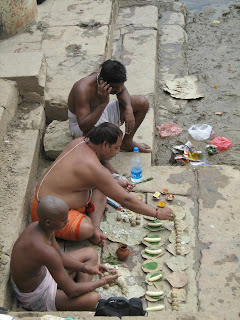25 year old sales-person mentioned below

Dear Richard,
Thank you for your sweet and insightful comment. Noah and I also had a couple of really nice interactions with street sales-people. There was one ghat, centrally located, that we ended up at a couple of times a day. there we would sit, watch the goings-on of the day, drink chai from flimsy plastic cups, and be recognized by a few of the sales-people. Our favorites were a twelve year old girl selling post cards, and a 25 year old mother of two selling stone elephants, post cards, and about anything else you needed. Before, during and after our minimal financial dealings, there was a genuine sense of human interaction - curiosity about each other's world.
Though the constant barrage of "boat, you want boat," or "hashish" or "postcards" or "massage, only ten rupees" was annoying, I cannot condemn them their aggressive sales tactics, for they are born of desperation. It is not fair, coming from such comparatively affluence, to judge those who are eking out a living, day by day, when the difference between making a sale or not might result in not eating that day.






 . At some point during the day you hear chanting and then a funeral procession passes you by, with a flower covered body resting atop bamboo poles. This is what you do in Varanasi - sit on the ghat and watch.
. At some point during the day you hear chanting and then a funeral procession passes you by, with a flower covered body resting atop bamboo poles. This is what you do in Varanasi - sit on the ghat and watch.










































